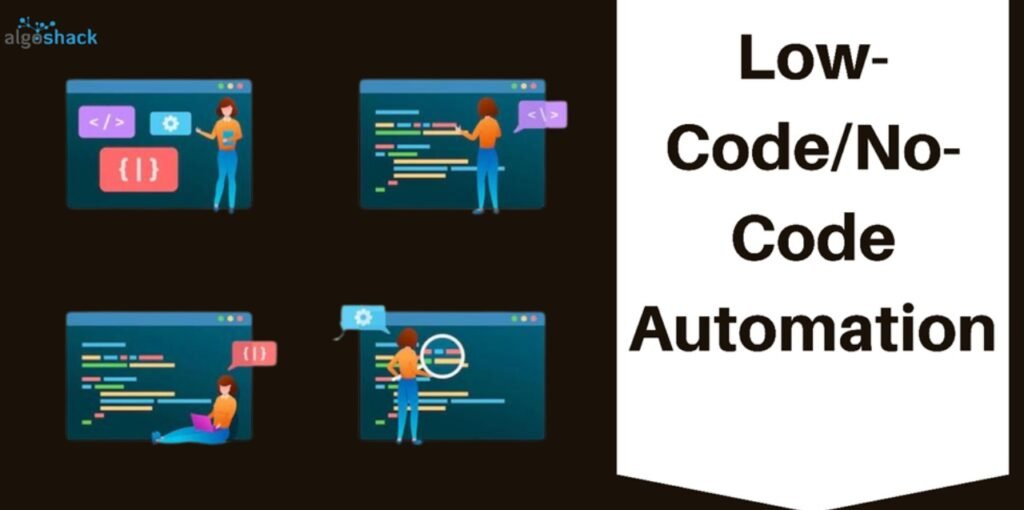Introduction: Low Code / No Code Automation
Hearing and reading Low Code or No Code Automation a lot these days, but don’t know what exactly it is?
Well, browse no more!!! Our comprehensive coverage of the topic in this passage will solve your queries in detail. We will begin with the definition, continue with advantages & features, and conclude with the benefits of choosing algoQA for Low Code or No Code Automation.
What is Low Code No Code Test Automation?
Low code or No code automation testing is a contemporary software testing method with minimal or no coding requirements. It means people from HR, IT, Operations, and any other team can perform test automation without technical know-how of programming languages. It has democratized the application testing procedure, and greater number of persons can develop, run, and manage application testing before launching in real-world operations for end-users.
How do LCNC works?
LCNC approach works on automatic coding, visual programming, and product-driven design. Platforms like algoQA have been designed especially for end-users familiar with the workflow of the applications and business process, without coding knowledge as a prerequisite. Low Code No Code empowers non-automation engineers and encourages them to participate in the software test automation life cycle effectively.
Steps in the LCNC development process for software testing:
Define Goals and Desired Outcome The first step is defining your goal and desired results for the application. The purpose could be for customers or internal functions.
Crucial questions for collecting data are:
- Who will be using the application?
- What will be the expected traffic on weekdays or weekends or festival seasons?
- What could be problem areas in real-life operations?
- How much and what type of data needs for these questions?
And so on. Create a workflow
LCNC development tools allow people to specify and enlist the required workflows and test procedures. These tools identify individual modules according to purposes and program to develop as independent entities. For example, your team can arrange separate modules for generating data, starting an action, testing in real-life dummy situations, and so on. People can develop automation tests here through modules and integrate them to attain the desired results. Automation Testing and Implementation
LCNC platform sorts out back-end loopholes and application complexity with a few clicks. After the resolution of bottlenecks, the app becomes ready for end-users. Finally, software professionals check the application with recommendations for deployment. Once all is done and dusted, you can launch the application for general purposes.
Benefits of Low Code No Code Testing Automation
- One of the most significant advantages of LCNC is its democratic nature. It eliminates the need to learn to code to conduct software testing.
- Anyone with rudimentary or even nil programming knowledge can test and deploy glitch-free applications.
- LCNC creates citizen developers. It improves collaboration between software professionals and other departments.
- Low Code or No Code helps to reduce the workload on programmers and testers. The team responds faster with easy-to-use LCNC platforms like algoQA.
- Reduces software testing and development process time and therefore improves faster delivery of web and mobile applications.
- Organizations do not have to cough off regular maintenance expenses with the less complex structure of LCNC.
- More intuitive user engagement and improved inter-departmental work efficiency
- The purpose of LCNC is to simplify the development process. It has been designed to meet the need of creators and end users.
- People can rejig and redesign the principal elements and fundamental code structure. It makes development faster and more convenient. You can also connect and integrate applications, procedures, and workflows with existing web & mobile apps.
- According to Forrester, LCNC makes application testing and development around twenty times faster than traditional coding methods.
Conclusion:
- Users can deploy AI and ML-based technologies to provide suggestions for test automation and deployment according to the given dataset.
- Agile for changing compliances and opportunities
- The ability to adapt & respond faster improves CX and boosts business image.
- Internal teams handle the development process and manage excess workloads. Hence, organizations do not need to outsource sensitive workflows to a third-party entity. It helps to ensure privacy and security. Users of Low Code No Code Processes Low Code No Code Methods are going to be applied in more than sixty-five percent of software testing and deployment globally by 2024. (A Survey of Gartner) Businesses and organizations are using LCNC in the supply chain, manufacturing, finance & accounts, process automation, information technology domain, human resources, etc. Benefits of Choosing algoQA for LCNC Test Automation.
- algoQA is an AI-managed platform for end-to-end automation. It also supports Low Code No Code test automation.
- Test automation using algoQA does not require scripting and technical know-how.
- Users can execute automation scripts anywhere and with technology of their preference.
- Single platform for API Test Automation, Load Automation, and UI-Based Test Automation
- algoQA provides easy-to-maintain scripts that are not proprietary.
- Automation script for web apps, mobile apps, hybrid apps, embedded software, and robotic process
- A SaaS-based automation platform and ensure greater returns on investment.
- Machine-generated thousands of easy-to-execute test scripts and test cases
- Helps businesses to reduce go-to-market time. It saves up to 80 percent of automation cycle time. algoQA offers a comprehensive package for automation requirements.
Contact us for a demo
Click here to try FREE version of algoQA



